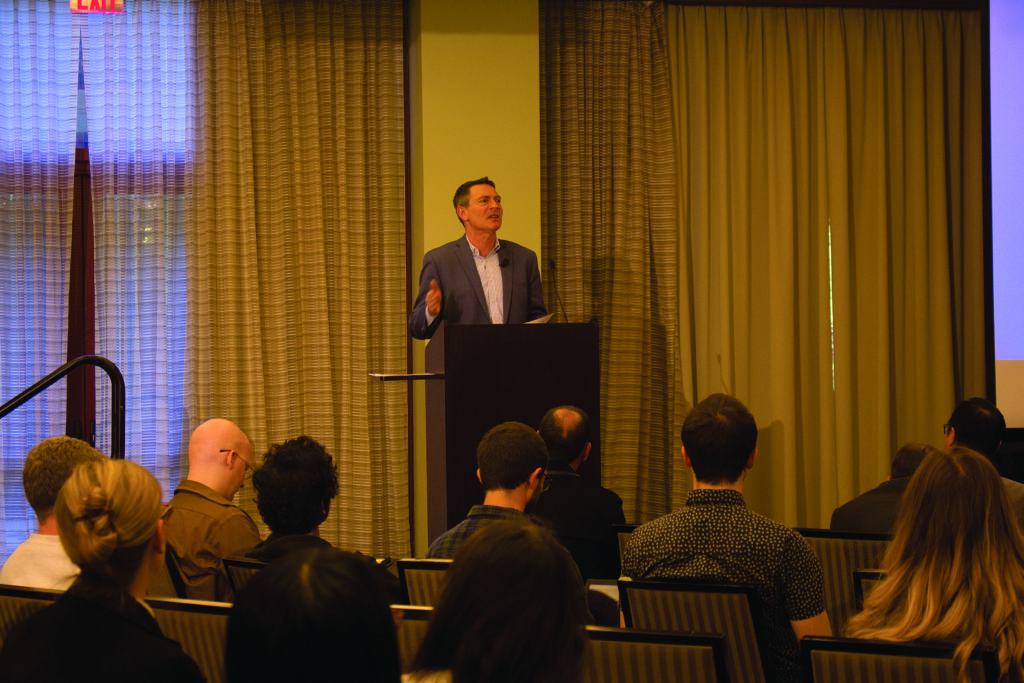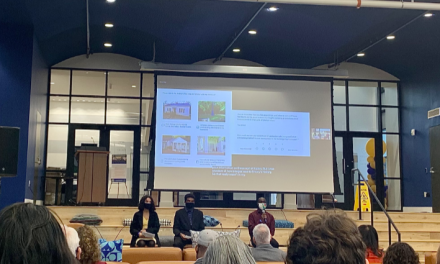
Former anchor for CNN International Jonathan Mann discusses lying from both the media and politicians./Michelle Lou, Executive Editor
“Donald Trump is the best thing that could’ve happened to CNN,” former anchor for CNN International Jonathan Mann said at “The Lying Conference.” “CNN’s profits are up and ratings have gone through the roof.”
Mann discussed lying by both President Donald J. Trump and the media, as well as the role of technology in information dissemination. The event, held at the Emory Conference Center Hotel on Nov. 17, was hosted by Emory’s Department of Psychology and featured presentations from various scholars and writers on lying. Attendees came and went throughout the day, and the conference room accommodated a maximum of 135 people.
Trump has been accused of lying more than any other public figure in recent memory, according to Mann. The Washington Post’s tally of Trump’s lies currently stands at 1,628 false or misleading claims, which averages to about five false claims per day.
The mainstream media is doing its best to keep track of and report on the president’s lies, but outlets are at a constant disadvantage because researching and rebutting a lie is more time-consuming than issuing a lie, Mann said. It also doesn’t help that journalists’ efforts to tell the truth are being pushed back by the most powerful man in the world, who constantly criticizes mainstream media and calls it “fake news,” according to Mann.
“When we do catch up … there’s a new lie,” Mann said. “Like waves, each one erases the previous one and the media are always behind.”
Mann also argued that, although CNN is guilty of labeling content as “breaking news” when it’s not actually breaking to boost ratings, right-wing media has played a critical role in misinforming viewers and changing the narrative of what the news media does.
Mann said that lying is widespread in the news today, and if people don’t feel outraged that they are not paying attention. A main reason why lying has become widespread is that there is no single group that controls what news outlets report on or ensures that they are telling the truth, according to Mann. In the past, a small group of wealthy, white men in control of the mainstream media organizations decided which stories to report, but the internet has given a platform to millions of unchecked voices, and well-meaning amateurs and extremists are on a level playing field with traditional media, Mann said.
Right-wing media outlets, including radio shows and YouTube channels, can push their agendas to more people than before. For example, right-wing radio host Rush Limbaugh, whose show is broadcasted to about 650 radio stations, told his listeners that the threat of Hurricane Irma was being exaggerated by meteorologists with a political agenda to convince people of global warming, Mann said. After Limbaugh had understated the dangers of the storm, he evacuated his Palm Beach mansion. The storm resulted in a death toll of 75 people, according to The Miami Herald. Mann described Limbaugh’s spread of misleading information as a “criminal act.”
Mann also stated that the reach of these right-wing outlets are problematic because they relay false information to audience members and tell viewers that mainstream news sources are intentionally and consistently lying to them.
“[Viewers] are being told … that The Washington Post, The New York Times, CBS and CNN are lying to [them],” Mann said. “Millions of people are listening to this, and they are believing them.”
Mann referenced a Politico poll which found that 46 percent of voters and 76 percent of Republicans think the media fabricates stories about Trump. He also pointed to PolitiFact, a fact-checking website that rates the accuracy of claims by elected officials and others on its Truth-O-Meter. According to the PolitiFact scorecard for Fox News, 60 percent of statements made by pundits on Fox News and Fox Business Network are either “mostly false,” “false” or “pants on fire.”
Mann also spoke about Russia’s role in spreading false information online before the 2016 U.S. presidential election. He said he was shocked to see how many people Russia reached with their misleading information through social media. He believes this is partly because people don’t view social media websites with the same level of skepticism as they view news outlets.
The full extent of what the Russian government did is still unknown, but Facebook estimated that 126 million Americans saw fraudulent posts on its website by Russian agents, according to the Times. Additionally, Russian agents sent more than 130,000 tweets and posted more than 1,000 videos to YouTube, according to the Times. Americans had no idea that those posts were created by Russians because they were often attributed to pages with names such as “Heart of Texas” or “Blacktivists,” according to Mann.
Mann encouraged the audience of about 50 people to seek out good journalism.
“This is the best time in human history to find out what’s going on,” Mann said. “There is more journalism, and information is more easily attainable than it ever was before … and most of it is free and available 24 hours a day.”
Jessica Kubert (20C) said she was “pleasantly surprised” that someone who used to be a part of the media wasn’t afraid to criticize and acknowledge the problems with some news outlets.
“I feel both worried and good about the role the internet plays in the spread of news stories now and in the future,” Kubert said. “Hopefully if we end hyperpartisanship people will try harder to find out the truth and not just what fits in their viewpoint.”
Gordon Waldman (18C) expressed concern about the increasing availability of misleading news online.
“It’s interesting how, because of the internet and social media, how much easier it is to access news and get correct information, but there’s also the negative aspect of how easily we can be persuaded into believing something that is false,” Waldman said.
valerie.sandoval@emory.edu | Valerie Sandoval (20C) is from Greenville, S.C., and is majoring in economics and political science. In addition to the Wheel, Valerie is on the women’s ultimate frisbee team.





